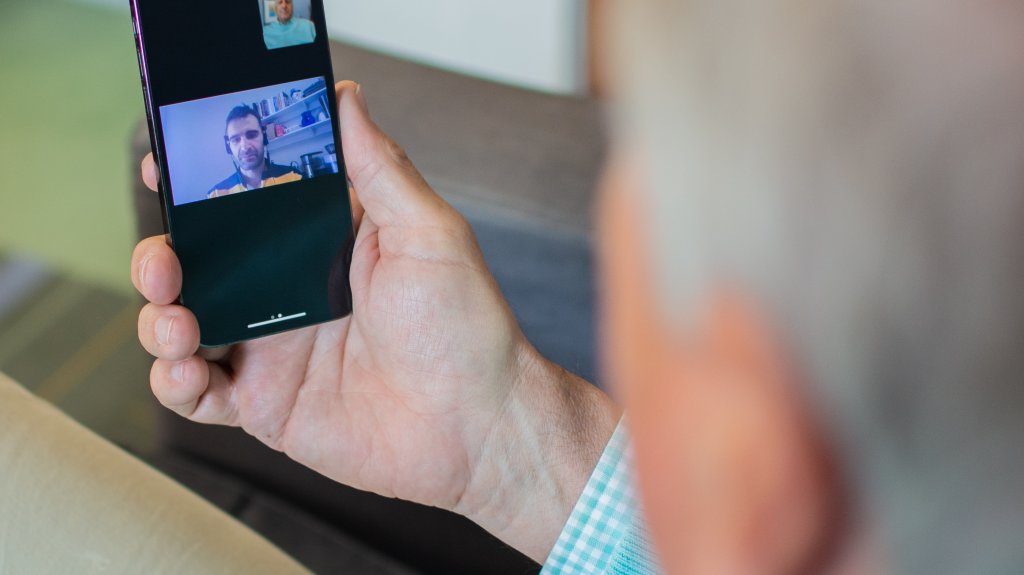Nicole (Nikki) Kemp, NP-C of Bernard Healthcare Center in Rocky Mount, Va. is providing hope for her patients by talking openly about how important mental health care is to meeting the overall health needs of her patients.

Earlier this year, Bernard Healthcare Center began offering free teletherapy to eligible patients of the clinic through the Virginia Telemental Health Initiative (VTMHI), a VTN-led program that provides free teletherapy to patients who don’t have insurance through participating free and charitable clinics.
The program aims to increase access to mental health care services to all Virginians, and introducing the idea to eligible individuals who are new to therapy supports is a critical first step.
“There are so many reasons individuals don’t want to seek therapy or counseling, especially in rural areas of the state,” Kemp said. “A lot of our patients are hesitant to share their personal information with a total stranger and [they may bring] other negative perceptions of therapy.”
Common Perceptions of Therapy from Virginians
According to Kemp, one of the most common reasons her patients are initially hesitant to participate in therapy is apprehension of confiding in someone who may not keep their information private. Other common barriers Kemp hears from patients include the idea that:
- “Therapy is too expensive.”
- “My life is no one else’s business.”
- “I’m not good at opening up to people.”
- “I don’t have the time for therapy.”
Broaching the topic of mental health care carries added weight with populations who may distrust the medical establishment for a variety of historical reasons. “Mental health services get grouped under medical care distrust. This is not an issue that can be solved overnight. There is a lot of work to be done in the industry,” Kemp said.
Best Practices for Debunking Therapy Stigmas
There is no one-size-fits-all solution for how to address negative stigmas for patients you feel may benefit from therapy. Instead, here are best practices Kemp uses to navigate a conversation and encourage support:
Communicate professionalism.
Therapists and counselors are licensed professionals that are dedicated to helping patients. Under law, they are required to keep conversations and details discussed during a session confidential, unless they feel a person is a danger to themself or others. This educational piece can be reassuring to patients
Mental health professionals are also ideal people to confide in. They offer unbiased support and do not judge. A bonus perk of teletherapy is that a patient may speak with a provider who lives across the state, so there is no chance of running into them at the supermarket.
Patients also have an opportunity to identify attributes in a provider that are important to them, including areas of expertise or other lived experiences. As part of the VTMHI program, volunteer providers receive education and training.
Let patients make their own choice.
It’s important to let patients have a sense of autonomy in their care. Don’t “talk down” to patients or command therapy services. Instead communicate the benefits of therapy and clear instructions for getting started. It’s their choice to take the next step.
Inform patients of accessible care.
Whether it’s a program offered through your clinic or practice or a third-party resource, be sure to relay free and accessible programs for patients that may not feel they can afford or have time for therapy services.
There are free and charitable clinics across the state that provide free therapy services through VTMHI to eligible and uninsured patients, and there are many more community resources for individuals and families coping with mental health challenges.
Don’t sell therapy as a solution.
Be transparent when discussing mental health services with your patients. Therapy is a way to develop coping techniques and a plan for bettering your patients’ overall quality of life. Scheduling a session is the first step in the right direction, and it will take time and work to reach their goals.
“Every patient is different. They have different experiences, personalities, and come from different backgrounds,” Kemp said. “I start by asking my patients ‘Do you like where you’re at right now (in terms of stress, happiness, etc.)?’ If they say no, then I tell them the first step is making a change, whether it’s scheduling a therapy session or at least being more open minded to the idea.”
Additional Resources
- Get the Facts About Psychotherapy, American Psychological Association
- Perceived and Personal Mental Health Stigma in Latino and African American College Students, National Library of Medicine
- Reducing the Stigma of Mental Illness, National Library of Medicine
- Mental Health Stigma, Rural Health Information Hub
- 9 Ways to Fight Mental Health Stigma, National Alliance on Mental Illness

